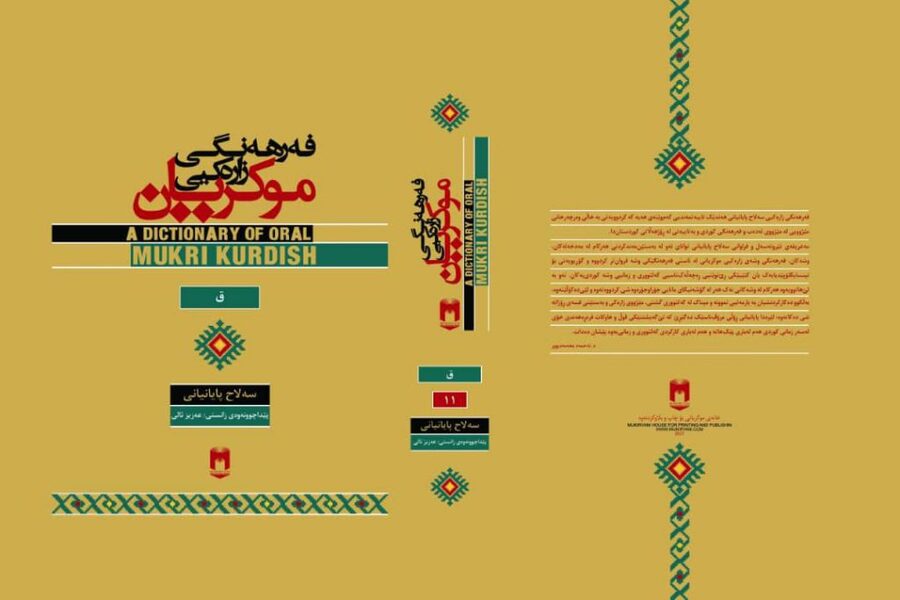Dictionary writing in the Kurdish language begins with a number of great names: "Sheikh Mohammad Khal", "Hazhar Mukeryani", "Abdulrahman Zabihi", "Giv Mukeryani" and … and the importance of each of these writers' works is different. However, they had a more significant impact on the use of language and culture among the people of Kurdistan in the past few decades.
Nowadays, dictionary editing has changed greatly compared to the past, and most of the writers, or in a better sense, the collectors of words and idioms and … are occupied with translating Persian, English, and French dictionaries into Kurdish without having the slightest knowledge on language or dictionary writing. Thus, the work that a dictionary writer must do, cannot be seen in these writers' works and a lot of major and minor mistakes can be found in their works. If we want to give examples, we have to devote independent research to it, and in the next articles, we will try to identify some examples of these translated and imperfect dictionaries.
However, in the midst of this imperfect background of dictionary writing, a serious and unique attempt was made that brought back hope to Kurdish language lovers. The remarkable work of "Salah Payaniyani" was the foundation of a project to re-identify and restore the wealth of the Kurdish language, and of course, it is the most special language project and the most comprehensive independent Dictionary of the Kurdish Language that has been written and introduced by dozens of great linguists.
This project should be called a national project rather than an individual effort. Although it is the result of only one individual's efforts which is "Salah Payaniyani", however, among other nations, such great projects are supported and sponsored by the governments that establish organizations for such tasks.
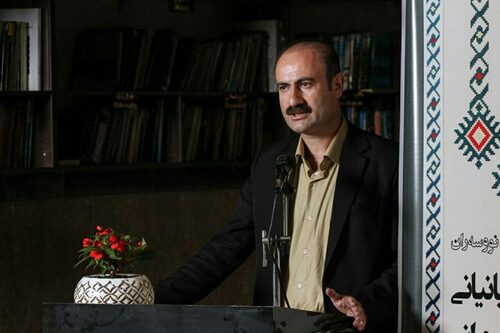
In this significant project, Salah Payaniyani has added more than thirty thousand pages to the Kurdish language. Some of the characteristics of this great project are as follows:
Although the Oral Dictionary of Mukeryan is not the first step in dictionary writing in Kurdish, based on some points that will be mentioned later, it could be said that it is a serious step and a new method in dictionary writing in Kurdish. It is a continuous work, 12 volumes of which have been published so far, with several other volumes that will be published later. First, we need to compare the dictionary writing situation in Kurdistan with other countries and then we need to clarify the way of dealing with a great phenomenon such as dictionary writing in the field of Kurdish written works based on the available knowledge. Since, the Oral Dictionary of Mukeryan, as it is clear based on its title, is the oral dictionary of only one region in the East part of Kurdistan, perhaps it is better to be compared with other dictionary writing methods that have been collected in this area. Among those dictionaries that have been written in this region, Hanbana Borina, a dictionary written by Hazhar Mukeryani, is the most popular and trusted work in this field by the majority of the people. There are many reasons for this dictionary to be the first choice of people among which the following points can be mentioned:
First, the personality and the writing abilities of the writer of Hanbana Borina, that is Hazahr Mukeryani, can be mentioned as the main point. Given that the main tools and powers of a dictionary consist of linguistic words and phrases, it is necessary that the writer of a dictionary be a knowledgeable person with a widespread awareness of the language. This can be justified for many reasons, perhaps the simplest of which for Kurdish writers and readers is that the readers need to refer back to a dictionary with scientific and linguistic value as a resource for their language. This was particularly, in the past two decades, the simplest way if not the only way of the writer's recognition and ability to attract the readers. Hazhar's name and works were more significant than this; however, the readers in the first few years or even a decade after its publication criticized its authenticity and popularity. An authenticity that has preserved Hanbana Borina as a valuable resource for Kurdish words despite all the criticisms on its style of work and limited words.
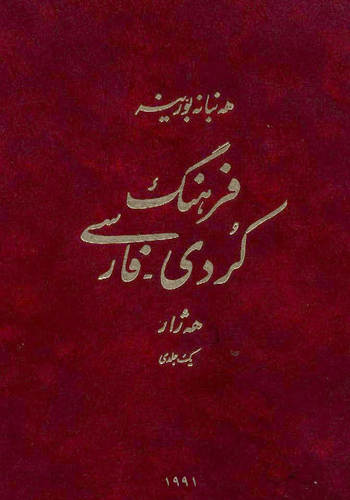
Second, due to the widespread vocabulary and phrases, the accents that are included in this dictionary, show the knowledge of the writer on these accents that are being used in this region and all these have increased this work's authenticity even more. For instance, since Hazhar was fluent in most of the dialects of Kurdish, the readers trust their search in this dictionary to find the meanings of the words they are looking up to without any doubts. Despite this privilege that Hanbana Borina provides, in the years after it was published, Kurdish writers and linguists noticed this point in Hanbana Borina that not only it does not cover all the words of the Kurdish language (i.e., words from all the dialects of the Kurdish language) but it also does not include all the words in the Sorani dialect of Kurdish although Sorani is the main dialect of this dictionary. So, after it was published, Sirwa Magazine added a section as an index to publish a bunch of words that were not included in Handaba Borina at all, or at least one of the meanings was not recorded. Later, some works were published that only consisted of those words that were missing in Hanbana Borina based on this dictionary's method. These works include Gulchninawa (Abdulrahman Hasanzadah), Farhangi Rezhga (Amin Gardiglani), and Farhangi Nahid (Mohammad Nahid). Gulchninawa's method was different from the other two dictionaries.
Undoubtedly, when Hazhar was preparing Hanbana Borina at that time, a man like him who knew most of Kurdish dialects and was a master of Kurdish language, knew himself that his work both on its method and its volume would not be flawless. He even mentioned this in one of his letters: "If you found something that I did not have included in my book, please write it down. Since it is the first work written in this widespread field, I know that I cannot say it is perfect. I hope this will be a foundation for our next generations so that they would create much better works."
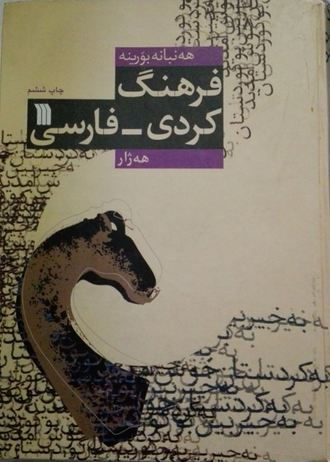
Although Hazhar, like Sheikh Mohammad Khal, thought his dictionary was the first work written in this way, however he knew that collecting and writing dictionaries is a difficult job thus it will need a foundation. He thought that his Hanbana Borina would be this foundation for the next generations. Although Hazhar pointed out that the Khal dictionary was one of his resources, he did not include all the words and phrases of this dictionary in Hanbana Borina. Undoubtedly, if future dictionary writers do the same thing, the gaps will never be filled completely. The other three works of Gulchninawa, Rezhga, and Nahid, as their writers have said, in fact are not perfect dictionaries but rather they are a step to fill the gaps in Hnabana Borina. Hasanzadah has collected three-word groups in his dictionary. The first group is those that are not included in Hanbana Borina. The second are those words that are included in Hanbana Borina but they have other meanings in the Kurdish language. The third are those words whose meanings are not correctly mentioned in Hanbana Borina. The words that Hasanzadah has collected in his dictionary are the more popular words in people's language and thoughts thus he has avoided including examples for them or mentioning their Persian meanings. The writer has said that he did not include examples and Persian meaning because he was alone in writing this dictionary which can be a difficult job.
In other dialects of the Kurdish language, the Bashour dictionary written by Abbas Jaliliyan is particular to Gorani, Lori, and Laki dialects. This dictionary includes a part of the words in the Kermashan, Ilam, and Lorestan regions. This work of Jaliliyan has two essential aspects; first, it is the first dictionary that includes the words in Kermashani, Lori, and Ilami dialects, and second, there are many words particular to the southern dialects of Kurdistan that are written with "L" and "G" letters next to them. The writer of this dictionary has separated the words that are particular to Laki, Lori, and Gorani in this way. This is what the other three dictionaries are written after Hanbana Borina did not provide.
Thus, dictionary writing in Kurdish still has to go through a long path. This needs a lot of patience and time so that each dialect of the Kurdish language writes their dictionaries in those dialects. Then a patient and fluent master of the Kurdish language could collect a comprehensive dictionary out of all these dictionaries so that the Kurdish readers and writers do not have to search one of those dictionaries to find a meaning they are looking up and Kurdish dictionary writing also steps towards a unified state.
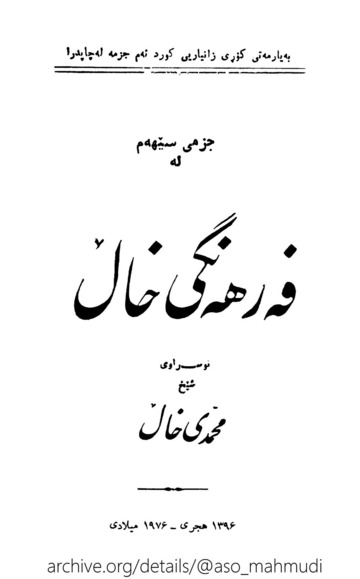
Usually, when one is looking up a word in one of the Kurdish dictionaries, some points are found that can be regarded as a flaw for all the Kurdish dictionaries which is ignoring other dictionary writers' works although not intentionally. If we consider Hazhar's Hanbana Borina as a valid example, Hazhar needed to study the dictionaries written before his work such as Khal and Kurdish Language Qamus and he had to use them as a foundation for his work. Hanbana Borina was published in 1990 so it was necessary that all the words in the Khal dictionary that was published in 1976 and Kurdish Language Qamus published in 1988 for the second time be included in Hanbana Borina. The Kurdish Idioms dictionary written by Abdulwahab Shekhani in 2009 also needed to include all the idioms that were included in previous dictionaries such as Khal and Hanbana Borina and Zabihi Qamus. Now some examples will be mentioned below that show each of these dictionaries has ignored the works done before them:
Peshmaman: a woman who sits next to a woman who is about to give birth to help her during the process (Khal, under the term of Peshmaman) which is not included in Hanbana Borina.
Tarakal: the wheat cultivated in wetlands (Khal, under the term Tarakal).
Tarakal: cultivating land that is wet due to rainfall (Hanbana Borina, under the term Tarakal). This shows that Hanbana Borina has not included Khal's meaning for this word.
Nawira: remarkable (under the term Nawira) that is not included in Hanbana Borina.
Pachinar: It is included in Khal but not in Hanbana Borina.
Barkhana Kirdn: It is included in the Kurdish Language Qamus but not in Hanbana Borina.
Bar Nabrdn: It is included in the Kurdish Language Qamus but not in Hanbana Borina.
Barik and Bnesi: It is included in Hanbana Borina but not in the Kurdish Idioms Dictionary.
Bn Kilk Khurandn: The Kurdish Idioms Dictionary does not include its second meaning but Hanbana Borina does.
Papyasawin: The Kurdish Idioms Dictionary does not include its second meaning but Hanbana Borina does.
These are a bunch of examples to show the dictionary writers in Kurdistan have ignored one another's works which has led to a huge gap to be created in all of their works. For example, if Hazhar had looked at Khal and Zabihi's works like this, Hanbana Borina would be undoubtedly much richer. The Oral Dictionary of Mukeryan shows the least amount of this flaw for many reasons that will be mentioned later. Although Salah Payaniyani in the first volume of this work mentions a quote from Ahmad Shamlou in the preface, perhaps to justify his work's flaws, however, despite that quote he also says: if I had to wait so long to find and correct all the flaws in this work, it would never be finished. The Oral Dictionary of Mukeryan is the richest dictionary with a particular method written in the Kurdish language full of words, terms, idioms, proverbs, compounds, and riddles. We will discuss most of these sections in the next articles.
Part 2:
"Mukeryan Oral Dictionary", a Cultural Encyclopedia - Part 2

